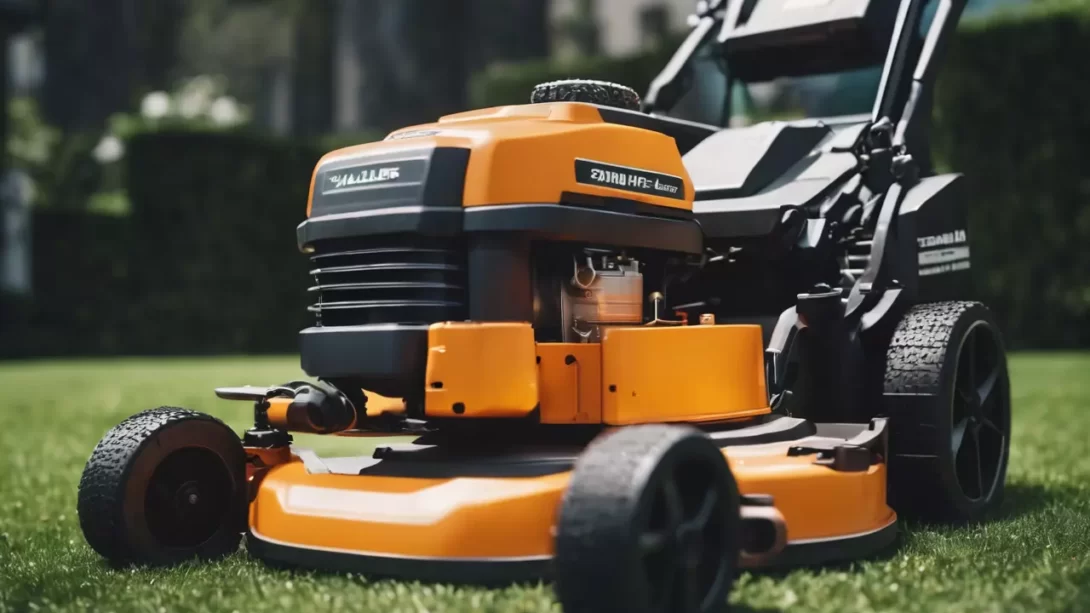Modifying a standard lawn mower to achieve higher speeds can be an exciting project for enthusiasts. This undertaking involves enhancing various components of the mower to improve its efficiency and performance. However, it’s crucial to consider safety and the legal implications of modifying a lawn mower, as these machines are not originally designed for high speeds.
Lawn Mower Mechanics
A basic understanding of lawn mower mechanics is essential before starting any modifications. A typical lawn mower consists of an engine, blades for cutting grass, a chassis that houses these components, and a drive system that propels the mower. In fast lawn mowers, these components are modified or upgraded to achieve greater speed and efficiency while maintaining the mower’s primary function.
Engine Upgrades
Selecting the Right Engine
Choosing the right engine is the cornerstone of building a fast lawn mower. The engine should have enough power to handle increased speeds without compromising the mower’s stability. Consider factors like horsepower, torque, and compatibility with your mower’s chassis. Popular engine brands known for performance and reliability should be on top of your list.
Engine Modifications
Improving the lawn mower’s engine involves several steps:
- Upgrading the Carburetor: A high-performance carburetor can increase the amount of fuel and air mixture going into the engine, thereby boosting power.
- Enhancing Air Filtration: A quality air filter ensures clean air intake, which is crucial for engine efficiency and longevity.
- Modifying the Exhaust System: A performance-oriented exhaust system can significantly improve engine output. This involves using exhausts that offer better airflow and reduce back pressure.
These upgrades need to be balanced to ensure they work harmoniously, providing a noticeable increase in speed while maintaining engine health.
Transmission and Drive System Modifications
Upgrading the Transmission
An upgraded transmission is vital to handle the increased power from the engine. Here are the key considerations:
- Choosing a Transmission: Look for a transmission that can handle higher torque and speed. This might mean switching from a standard gear-driven system to a more robust hydrostatic transmission.
- Installation Challenges: Upgrading a transmission can be complex. It may require custom fittings or modifications to the mower’s frame. Ensure you have the necessary tools and expertise, or seek professional assistance.
Improving the Drive System
Enhancing the drive system is crucial for transmitting power efficiently from the engine to the wheels.
- Drive Belts and Pulleys: Upgrade to heavy-duty belts and pulleys to withstand increased stress. Aligning and tensioning the drive system correctly is essential to prevent slippage and wear.
- Gears: Opt for high-performance gears that can handle increased speed without compromising torque, especially important for maintaining mowing efficiency.
Chassis and Suspension Adjustments
Reinforcing the Chassis
With increased speed, the lawn mower’s chassis must be strong enough to handle additional stress.
- Strengthening Techniques: This may involve welding additional supports or using stronger materials to reinforce the frame.
- Materials Needed: High-grade steel or aluminum can be used for reinforcement. Ensure all modifications are securely attached and do not interfere with the mower’s operation.
Upgrading the Suspension
A fast lawn mower requires a good suspension system for stability and control.
- Suspension Types: Depending on the original design, this could mean adding shock absorbers or upgrading existing ones.
- Installation: Proper alignment and installation are crucial for the suspension system to function effectively. This step might require technical knowledge or professional help.
Wheel and Tire Modifications
Choosing the right wheels and tires is critical for speed, traction, and safety.
- Tire Selection: Look for tires with a tread pattern suitable for higher speeds yet capable of maintaining grip during lawn mowing. Racing mower tires or ATV tires could be suitable options.
- Wheel Upgrades: Stronger wheel hubs and axles might be necessary to handle the additional forces at play. Ensure that the wheel size and type are compatible with the mower’s design.
Safety Enhancements
As speed increases, so does the risk, making safety enhancements a critical part of building a fast lawn mower.
Braking System Upgrades
Upgrading the braking system is essential to ensure that you can safely control and stop the mower at higher speeds.
- Advanced Brakes: Consider installing disc brakes for more effective stopping power. This may involve significant modifications to the mower’s wheel assembly.
- Testing and Adjustment: After installation, thorough testing is necessary. Ensure the brakes are responsive and can bring the mower to a quick stop without locking up the wheels.
Safety Features
Incorporating additional safety features can prevent accidents and injuries.
- Roll Cage: Adding a roll cage provides protection in case of rollovers, which are more likely at higher speeds.
- Seat Belts: Install a seat belt, especially if the mower will be used on uneven terrain or slopes.
- Kill Switches: These emergency stop mechanisms can immediately shut down the engine in case of a loss of control.
Final Assembly and Testing
Once all modifications are complete, the mower needs to be carefully assembled and rigorously tested.
- Assembly Guide: Follow a systematic approach to assembling the modified parts. Double-check all connections, especially those related to the engine and drive system.
- Testing Procedures: Begin with low-speed tests to ensure stability and control. Gradually increase speed, monitoring the mower’s handling and performance. Pay close attention to any unusual vibrations or sounds that could indicate a problem.
- Fine-Tuning: Based on the testing results, make adjustments to the engine tuning, suspension settings, and alignment to optimize performance and safety.
Conclusion
In conclusion, while creating a fast lawn mower can be an exciting and rewarding project, it requires a careful and knowledgeable approach. Adhering to safety standards, understanding the mechanics, and regularly maintaining the mower are all part of responsible ownership. Whether you’re a hobbyist or a professional, the journey to building a fast lawn mower is one that combines innovation, skill, and a deep respect for safety and engineering principles.



